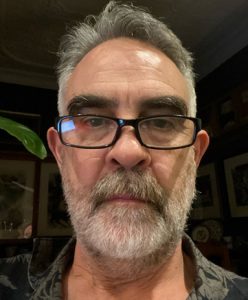Prof David Paton

TEACHER EXCELLENCE
In the face of our enticing, colourful and technically sophisticated digital world, which is threatening to eclipse traditionally taught ‘Drawing’, it takes special courage, tenacity and confidence to argue for the essential place of tried and tested methods of approaching this discipline. This, however, is exactly what Prof David Paton has done. With thirty-seven years of experience behind him, and in the face of some institutions replacing ‘Drawing’ with a more modern alternative, he offers a powerful disciplinary voice, which insists on the value of teaching Drawing traditionally and keeping it as a key foundational component of the Visual Arts curriculum.
Prof Paton always begins by challenging his students with the unsettling question, “Is this really what I see?”. By foregrounding doubt and uncertainty, he opens the pedagogical space necessary for students to learn to relook at their world and, through this, to prepare for the world of work. As students slowly begin to understand the interplay between visual, spatial and conceptual issues, they develop the ability to convert 2D images to 3D and link art to the real world. Drawing on their own experience, students are constantly and actively involved in interrogating assumptions, debating and problem solving. Over time, they come to see themselves in their work that is embedded in the realities of the African context. This approach has enabled his students to excel, and they have won numerous national and international awards, which is an indisputable testimony to the validity of this approach.
The depth of insight and skill that Prof Paton brings into his teaching has not gone unnoticed – it has gained wide acclaim by both peers and students alike. His undergraduate students celebrate him as a teacher of “passion, strength and compassion” and as a “source of inspiration” who is known for his “positive engagement” and his commitment to ensuring “a constructive learning environment” where “art was never separated from the world”.
A former master’s student goes even further when, looking back, she says, “he has an energy that captivates a space and allows individuals to perceive the world from an entirely different perspective . . . to comprehend the artistic world with insightful eyes”.
We celebrate the development of these “insightful eyes” this evening as we congratulate you, Prof Paton, on this prestigious award and wish you well in all your future endeavours.
